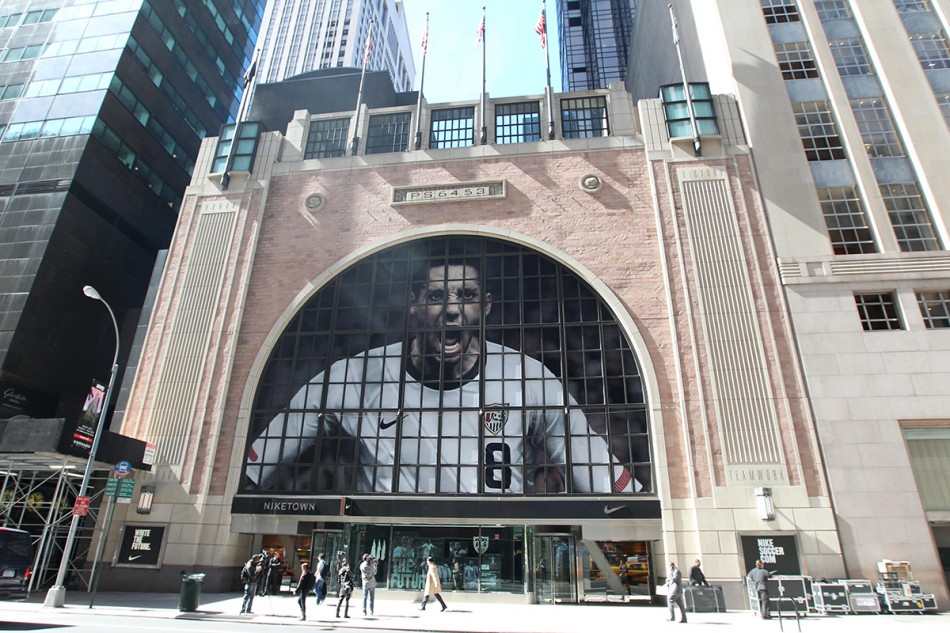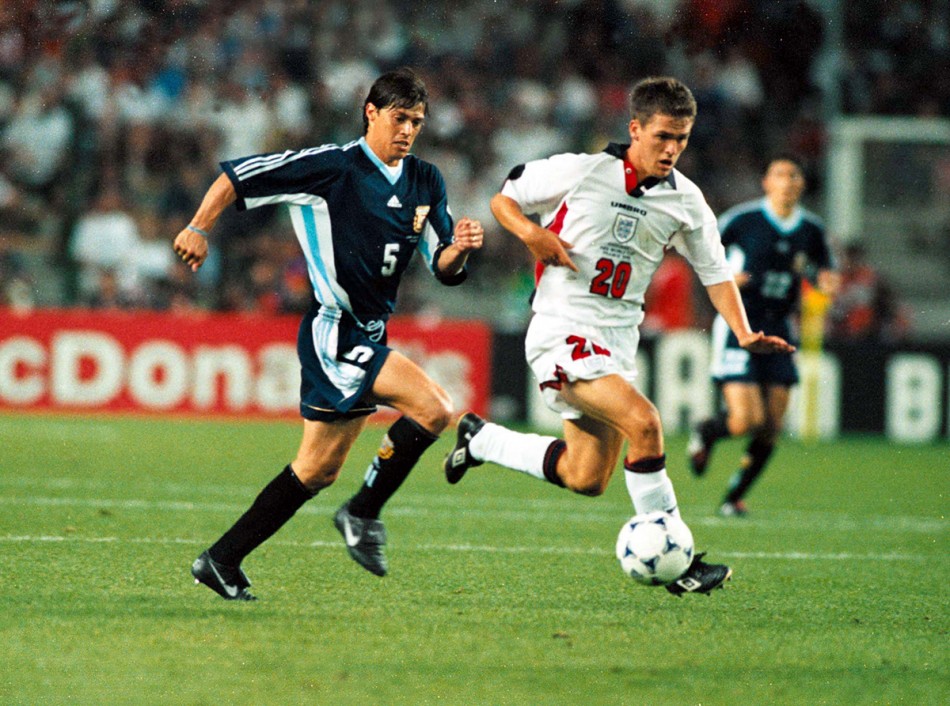In case you hadn’t noticed, the World Cup got underway last weekend in South Africa. For one month every four years, the planet’s greatest sporting event has, historically, had a tendency to consume my every waking second. This year is no different, although since Italy lifted the trophy in 2006 I’ve obtained United States residency, meaning I am experiencing the tournament from this side of the Atlantic for the very first time. This situation has led to some interesting observations, some more expected than others, as I grapple with the clichéd notion of being an avid soccer nut in a country that — as we’re so often told — just doesn’t care.
Johannesburg is six hours ahead of New York, so I get to watch the day’s earliest match before leaving for work. Once in the office I close my internet browser and hunker down until I can return home, where, thanks to the miracle of DVR, two more games await my viewing pleasure. Though avoiding the score has proven more difficult than expected. I’ve had to change my route several times when I’ve seen soccer fans amassed outside a sports bar, and was even forced to move to the other end of a subway car when I heard some Brazilians talking futebol.
This isn’t the first time I’ve had to set the alarm for football matches. During the 2002 World Cup in Korea and Japan (when I was still living in England), most games were scheduled for the early morning, a novelty which resulted in BBC commentator John Motson developing a tiresome fixation with breakfast-related puns. Watching football on American networks can also bewilder, but for entirely different reasons. I still don’t understand why the commentary is called “the call” (as in “Martin Tyler with the call”) or why half-time is known simply as “the half” (“We’re goalless at the half.”). The alternative is the local Spanish language channel Univision, where the World Cup is co-hosted by young latinas in figure hugging national team jerseys, and any punditry is generally forsaken in favor of dancing, chanting and fervent flag-waving. Over on ESPN coverage is generally quite polished, with some big names on the panel: Klinsmann, Gullit, McManaman, McCoist, Lalas, Bartlett, Martinez (OK, some names are bigger than others). It’s clear the anchors are being fed information about players and previous tournaments by a soccer intern with encyclopedic knowledge of World Cup history, in a desperate but comprehensible attempt to dispel the myth that Americans know nothing about the game.
Whether you see it as a failure or a refusal, the fact that America has never fully embraced soccer is both fuel for those who dismiss the sport and a burden to its genuine fans. New York, of course, is a bit different. The city is still a natural port of call for anyone arriving from overseas or across the border, and some 36% of the current population is foreign-born. That’s a lot of soccer fans. New York State has no official language: English is obviously the de facto language but of the nine million people who live in the city less than half are native English speakers. On a day like today — when the air is thick and temperatures hit the mid-90s and football is blaring out of every bar, deli and taxicab – New York feels a lot closer to Naples or São Paulo than the United States.
That’s not to say the locals don’t make themselves heard. Yesterday I saw dozens of young Americans in USA jerseys heading to bars to watch their team’s match with Slovenia, while for several weeks shoppers on 57th Street have been subjected to Clint Dempsey’s screaming face looming large on the exterior of NikeTown. The United States’ games have even made the front pages of the Times, Post and Daily News. Despite only intermittent success in recent years, interest in the national team has steadily risen to a point where they today merit respect and generate media frenzy and support during the World Cup. Many casual American soccer fans become genuinely curious about the tournament, and perhaps even a tad envious of the kind of passion it invokes in people of other nationalities.
But come September it’s unlikely these same fans will be getting up at nine on a Sunday morning to watch European league matches. For this reason I sometimes sympathize with the professionals representing the United States, as they’ve had to work doubly hard to garner support from skeptics and casual, fair-weather fans whose interest is piqued only every four years. It’s like when people get excited about synchronized swimming during the Olympics.
A college friend of mine (and self-confessed soccer ignoramus) wrote to me recently asking me for my take on why the game has never taken off in the United States. After all, since the 1960s a host of characters from the worlds of football, politics, entertainment and business have tried to make soccer a more serious sport here, without ever fully succeeding. In the 1970s some of the sport’s biggest names — including Pele, Beckenbauer, Best and Cruyff — made the NASL a marketing man’s dream, but the novelty wore off by the early 1980s and the league collapsed soon after. In 1994 the United States even hosted a highly successful World Cup (breaking all attendance records), but the MLS (which was created as part of the U.S.’s hosting bid) has had a turbulent history ever since, and remains a relatively weak league whose rosters are populated mainly by young American talent and veterans from South America, despite more recent high-profile European arrivals, such as David Beckham and Thierry Henry.
Soccer is the most played sport at high-school level in this country, and extremely popular in the major cities and particularly among the under-30s, but I don’t think it will ever “take off” in the way my friend was implying. The problem is precisely that: football doesn’t really “take off” anywhere – it’s ingrained culturally and people either get it or they don’t. Sadly for America everyone gets it but them. In Asia, large populations with growing economies such as Japan, China and India, have embraced the game more fervently in recent years, but they didn’t have their own hugely popular and highly lucrative sports leagues in place. In the United States the NFL, MLB, NBA and NHL are very much ingrained; soccer is not really necessary, neither economically nor culturally.
Then of course there is the game itself. A lot has been made of the cautious nature of the first round of matches at this World Cup, but it seems the ones who complain about the football (or the vuvuzelas for that matter) are the ones who don’t really enjoy soccer and probably begrudge having to sit through it. Many Americans I’ve spoken to this week have questioned the number of matches which have ended in parity, their impression being that a tied result is somewhat unsatisfactory. That a game must have a winner strikes me as a deeply American idea. I got into a very heated row with my boss twice this week after he suggested football would be improved if they eliminated draws from the sport entirely. Most surprising when you consider my boss is Italian — albeit one who moved to the Bronx in 1970 and now catches a football match only every four years (and then only when the Azzurri are playing). Major League Soccer conducted a similar experiment when it relaunched back in the mid-nineties. Concerned with the prospect of tied games, the league’s commissioners imposed an instant one-on-one sudden death shoot-out in the event of a match ending level after ninety minutes. In a perverse twist on the penalty shoot-out, the forward would start with the ball from the halfway line with only the goalkeeper to beat. This attempt to avoid alienating mainstream sports fans by making league matches — and penalty kicks themselves — more exciting only alienated soccer purists, and the league soon reverted to a conventional win-lose-draw points system.
In this regard both the MLS and my boss were guilty of seeing the game purely from the perspective of entertainment, which in this case means the ball crossing the goal-line. Personally, I’d always prefer to watch a tight 1-1 draw between two quality teams than an end-to-end goal-fest between two average ones. Fans who describe close World Cup or Champions League matches as “boring” also fail to recognize one of the elements that makes the game so special. Football is different to practically all other sports in that scoring is supposed to be difficult, so when a goal is scored it’s a big deal. It is a game built on patience and tactics, which of course enhances the tension and drama, which in turn are what make important games so absorbing. In basketball there is no element of tension or drama until the last 120 seconds of the fourth quarter, and that’s only if the teams are closely separated.
The very nature of football is contrary to the instant gratification provided by high-scoring American sports, which are first and foremost entertainment (and big business). Football is obviously entertainment in Europe too (and an even bigger business globally), but there are deeper cultural, social and political elements that give the game a greater resonance beyond the stadium, which if you’ve never lived in Europe or South America is perhaps not something that’s easy to comprehend. It’s for these reasons more than any other that I think soccer remains a sport that most Americans won’t think of again for another four years. But until then, if they ever change their minds they know where to find the rest of us.

